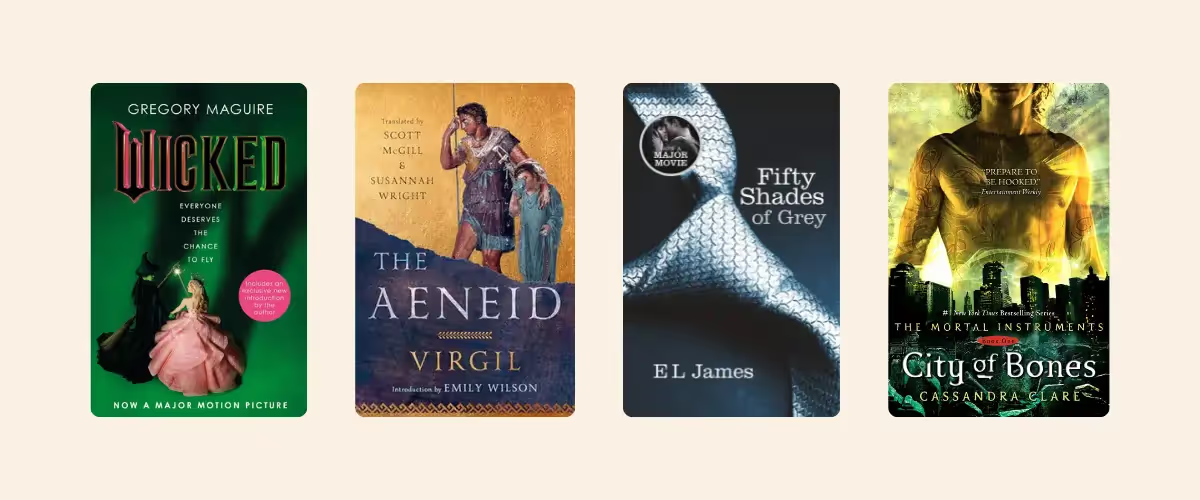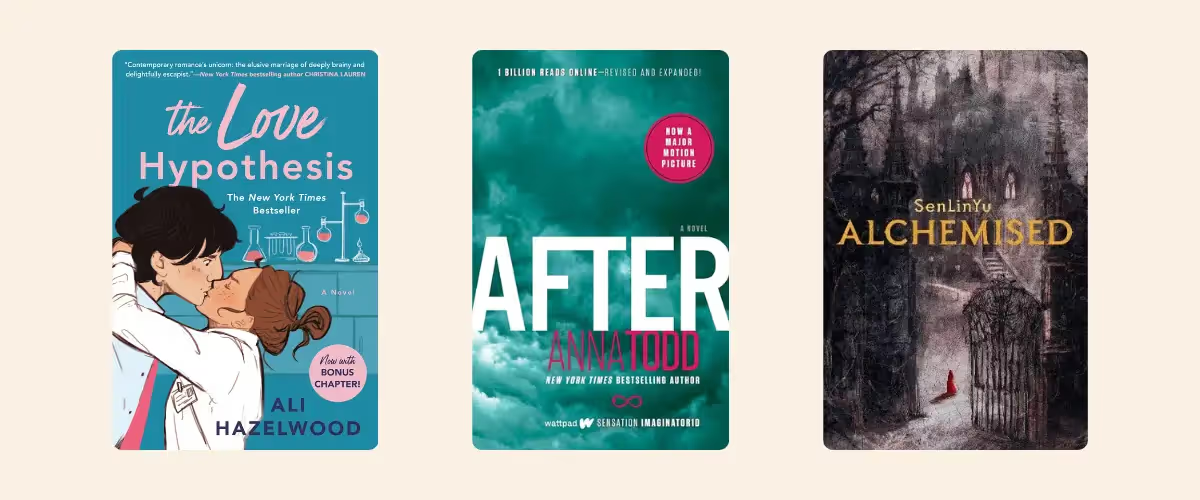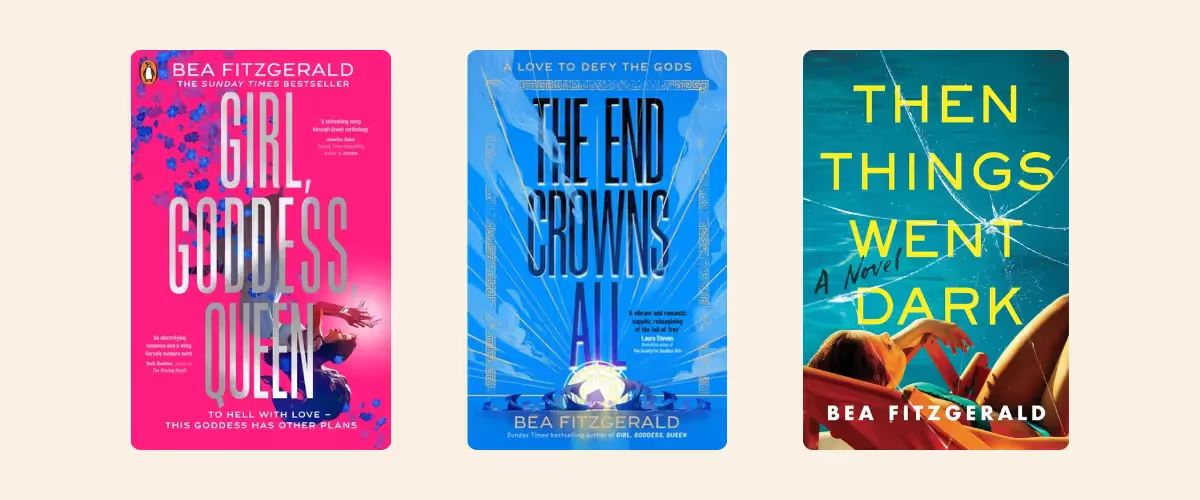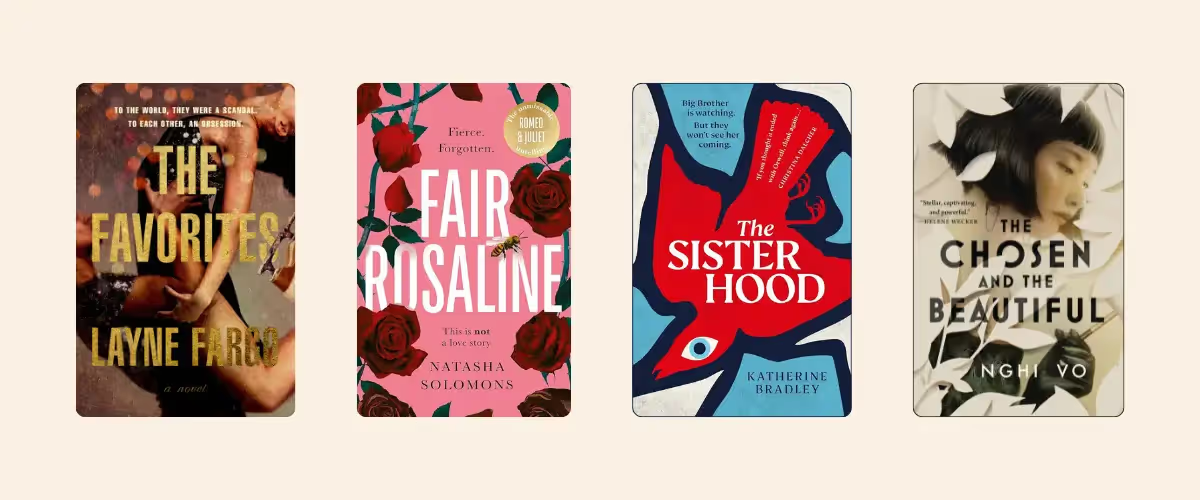Fan fiction has become a hot topic in publishing circles. With its ability to harness massive existing fandoms with huge online presences, writers of fan fiction—which had previously existed mostly outside of the traditional publishing industry—are now surging to the top of the bestseller charts.
But what is fan fiction (often referred to simply as ‘fanfic’), and should you be writing it?
Or are you already writing fanfic?
For many contemporary authors, writing fan fiction has been an inaugural step toward their writing dreams, proving that dabbling in other authors’ characters and worlds improves more than just your creative skills—as Bea Fitzgerald, proud fanfic writer and reader, will demonstrate.
Bea Fitzgerald is a Sunday Times bestselling, award-winning author and a writing coach at The Novelry. Her debut novel, Girl, Goddess, Queen, was the bestselling YA hardback debut of 2023 and won the RNA Romance Novel of the Year.
In this article, Bea explores the impact of fan fiction on the publishing industry and how dipping a toe in these incredibly creative waters can benefit us all.

How writing fan fiction can make you a better writer
Fan fiction is a thorny thing—not just because of what it is, but because it can be challenging to understand its role in the media landscape and the intensely proactive online communities surrounding fan work.
It’s a lot to wade into, but don’t worry! As a former fanfic writer, regular fanfic connoisseur, and chronically online author, I’m going to walk you through this nebulous space—and maybe even persuade you to give it a go yourself!
What is fan fiction?
It’s hard to provide a universal definition, but I would say fan fiction is any work that utilizes the characters (or, in some cases, real people) of an established enterprise. That could be a book, film, band, sports personality—anything you like.
It’s a wildly creative space but sometimes a little impenetrable. The extensive terminology within fan fiction might not make sense to outsiders (yes, I’m old enough to remember when spicy fics were called lemons), so I’ll list some key terms at the end of this blog. Any words or phrases you see highlighted in bold can be found in the mini-glossary further down the page.
How is fan fiction relevant to publishing?
It’s important to say that it’s illegal to sell or self-publish fan fiction in exchange for money. However, several authors have successfully used their fan fiction as a basis for a novel, layering in their own world-building and creativity to write something truly unique.
I want to be very clear that I love fan fiction. I think it fosters a specific sort of creativity, and fandom is a beautiful thing. In a world where it’s cool to be jaded, I will never not be awed by people who passionately and unapologetically love things. So, when I refer to these authors and their books, it’s fully in celebration of how they’ve used fanfic in their careers.
It’s also worth remembering a lot of Shakespeare’s original work is fan fiction of earlier plays and poems. Wicked is essentially Wizard of Oz fan fiction, and while I have the floor, Virgil’s Aeneid is pretty much Iliad fanfic. Humanity has always taken stories by original creators and spun them, reframed them, or retold them—and today’s fan fiction is a beautiful continuation of that.

You may already know that Fifty Shades of Grey began as Twilight fan fiction or that the Mortal Instruments series was originally Harry Potter fan fiction. In terms of the contemporary publishing landscape, recent examples of successful original work based on rearranged fanfic include:
- Ali Hazelwood’s book The Love Hypothesis, originally a fanfic named Head Over Feet (Reylo, from the Star Wars universe).
- After by Anna Todd, the first of a five-book series, initially posted as Harry Styles fanfic on Wattpad.
- The upcoming Alchemised by SenLinYu, whose fanfic Manacled (Dramione, from Harry Potter) is the original material for the book’s starting point.
Some authors have been approached by agents and editors on fanfic sites because their fan fiction has made it clear that they can write, and they then write a wholly original piece for publication—Hazel McBride recently shared on TikTok that this is how she signed with her agent for her upcoming book.

Characters in fan fiction
A key strength of fandom is characterization. You may think fanfic is easy to write, as the characters already exist. But everyone starts with their own idea of a character, like an archetype, so fanfic stories tend to be propulsive and character-driven. It’s also why tropes are so popular here—readers will happily consume multiple fanfics with a matching premise set in the same world and receive something different each time because each author has their own style and perception of the characters. If nothing else, it’s a lovely reassurance when we’re worried about someone else writing something similar to our own stories!
Fanfiction—even when it’s not
Some books may not have been fan fiction, but readers have been quick to draw on their fanfic similarities as reasons why they love them:
- The Idea of You by Robinne Lee (similarities to One Direction)
- In Memoriam by Alice Winn (similarities to Drarry, Harry Potter)
- Divine Rivals by Rebecca Ross (similarities to Dramione, Harry Potter)
These are wholly original works whose character dynamics, among other elements, remind fans of their favorite aspects of other works.
It’s also becoming common to see ships (a desired character pairing derived from the word ‘relationship’) used in the same way as comp titles.
Comps remain essential in publishing (pitching a book as Outlander meets Twilight, for example), but I’m also seeing descriptions like ‘Zutara on steroids,’ and it’s especially common for queer books to have a marketing angle such as ‘like Merlin if you think Merlin and Arthur should have kissed.’ It isn’t easy to summarize a whole book, so language like this indicates the story’s vibe and is particularly successful in romantasy, romance, and fantasy.

How fan fiction is impacting the market
It’s not just with ships and comps that we can see the influence of fanfic elements in the publishing landscape. I wrote a lot of fan fiction as a teenager, so when I moved on to original fiction (though there’s an argument to be made that my YA books are Greek mythology fanfic), aspects of it seeped through.
Girl, Goddess, Queen spent a year on submission—and then tropey romances boomed. Tropes are so common in fan fiction that I wasn’t even consciously aware of how many I had in my book until they became foundations for its marketing, and there I was with a fake dating, enemies-to-lovers book that featured a dagger to the throat and an only-one-bed scene. I didn’t write it for the market; I wrote it for the readership I’d had in the fandom space—people who know what they love and actively seek it out.
I also see the boom in spicy romance and romantasy as stemming from fan fiction. Mature (aka spicy) fanfics are incredibly popular; I was constantly asked to ‘add smut’ to my fan fiction (and to my first book when it finally sold), and there are numerous monthly challenges in this theme in the fandom space, including the infamous Kinktober.
Not all fan fiction is romantic, however, and another fandom favorite—Found Family—is a driving force in the present market. The cozy fantasy subgenre that took off a few years ago is, in my opinion, squarely rooted in the love for a good Coffee Shop AU.
.avif)
The controversy
As with everything, there’s regular conversation around fan fiction and its influence on the industry. That conversation is layered and complex, and while I’m not sure I can cover it all, I don’t want to sell you the joys of fanfic without giving you the bigger picture in terms of copyright law and how source material is used. Here are some things I’ve witnessed around the intersection of fan fiction and publishing.
Copyright infringement
Some people believe fan fiction shouldn’t be turned into published fiction (often referred to as ‘filing off the serial numbers’) because of copyright infringement reasons. As you can’t own an idea, just its execution, I personally disagree with this—but how it ties into the ideas of author, reader, and publisher spaces is interesting. Arguments have been made that editors should stay out of reader spaces, but in my opinion, agents and editors are sometimes just fans who read work online and stumble upon a writer who has created something they think is good enough to be published. But where is the line? If the editor of a published work approached someone writing fan fiction about it, I can certainly see that being a conflict of interest.
Queer ships vs straight ships
Despite the prevalence of queer ships in various fandoms, it is often the stories with straight pairings that get picked up by publishers. Drarry and Wolfstar are two popular queer Harry Potter ships, but the ones that get published are usually Dramione fics.
As fanfic writers can write and publish immediately, some TV showrunners have veered in strange directions to lead stories away from where fans believed it was going, just to avoid allegations that they copied fanfic endings or to keep the element of surprise.
Fan fiction is inherently written for the community. It’s crafted for love, not money, and is shared for free. Aside from the copyright law aspect, any efforts to monetize it will almost always be met with suspicion.
.avif)
Why fan fiction is good news
The fanfic space is a lovely place to be, where readers leave kudos, post comments on work, and set up alerts for new updates. If you’re looking to dip your toe into fan fiction, the most popular site is Archive of Our Own (AO3), though you can also look at Wattpad.
If you’re writing with us at The Novelry, it’s likely because you want to work on your original fiction, and while publishers have found that buying books from popular fanfic authors brings their mighty audience across, that’s unlikely to work for many authors.
So, how might fan fiction still be beneficial for you? Here are a few reasons to consider it!
1. To practice writing and develop craft
Fan fiction isn’t inferior to original fiction or a precursor to it—it exists as a wonderful thing in its own right. It undoubtedly builds skills that are beneficial to original writing, and with someone else’s characters already existing for you to write about, you can focus on the writing itself, hone your craft, and write with intention.
Drawing original plots from established media and copyrighted material is a brilliant creative exercise that asks how you might do things differently. Writing AUs is often how I break out of writer’s block—completely removing your original characters from their world and imagining how they would behave running a cafe or at college can inspire you to get to know them better. When I’m in a rut, I take my characters out of their high-stakes fantasy battles and send them to Disney World to reconnect with them and see how they’d behave! Think of it as a big, colorful writing prompt.

2. Learn what matters to readers
- Snarky banter?
- Tension?
- Fluff?
- Hurt/Comfort?
These elements form the building blocks of most romance books and they’re all key in fan fiction. It’s a perfect way to train yourself to pay attention to character interactions. Fanfic isn’t just about romantic pairings; it’s inherently about the character dynamics, and exploring these can be very useful to unpack and consider when you’re writing your own original story.
3. Flex your creative tendons
Anything goes in fanfic—and I really do mean anything. You have permission to be as wild as you like!
- Have a really niche book you were obsessed with as a child? Time to dig it out!
- Inspired to write a space-opera version of High School Musical ? Why not!
- Mad about how Game of Thrones ended on TV? Give it your own spin!
Fandoms also post writing challenges, sometimes monthly or weekly. There’s usually one through December, for instance, that comes with a daily prompt like ‘decorating the tree’ or ‘fairy lights.’ These prompts can be really useful in getting those creative gears turning. You could start each writing day by spending 20 minutes on a fanfic prompt before moving into your own work in a readymade creative headspace. Or you could use the prompts as exercises to explore your own story. You can absolutely write fanfic for your own book in a separate document to help you consistently consider who your characters are and what they might do.
I often advise the writers I’m coaching to ensure their plot is unfurling because of decisions the characters are making rather than them being made because it’s needed for the plot. So, this sort of character study can be really useful.
{{blog-banner-3="/blog-banners"}}
4. Get analytical
Ask yourself what it is about fandom pairings that make them such a popular ship. Can you replicate any aspects of this in your original couples? Whether it’s opposites attract or redemption arcs, the building blocks of fanfic are so helpful in understanding what readers want in the current market.
Some pairings feature characters who haven’t even met in the canon of their specific copyrighted material, so exploring why many people think those personalities are a perfect fit makes for an interesting case study.
5. Get your writing out there
Fan fiction allows you to post your writing whenever you want to and get feedback in real time. Publishing my fanfic definitely lessened my panic about sharing my work with the world when I was finally traditionally published (even if only a little bit!).
I last posted fan fiction in 2017, so I can’t promise the comments will be as lovely and encouraging as they were back then. As always, when putting your work out there, there’s a risk people won’t like it—but fanfic can be a great way of testing the waters and discovering your strengths as a writer.
.avif)
6. Foster community
Fandoms are active, sociable places. Fanfic writers often become friendly with other authors, artists might ask to make work based on your fic, and—as noted with recent publishing success stories—some fans will follow you over into original fiction.
This can be a great place to celebrate writing and an unapologetic love of things. Do be warned, though: as with all online communities, when the drama kicks off, it can kick off big!
7. Write for fun
When your writing gets wrapped up in publication goals and targets, it’s easy to forget that you first started writing because you love it. Fan fiction is a great way to enjoy the process again, and many published authors—Luna McNamara and Beth Reekles, for instance—regularly talk about how they write fanfic as a break from their main work because they enjoy it.
It’s amazing how quickly the words come when no pressure of deadlines or ambition is attached!
8. The freedom not to be concise
When you’re writing a novel, you’re constrained by market word counts—but a fanfic that’s 500k in length is perfectly normal! So, if you enjoy writing sprawling scenes, this is the space to do it. You have permission to go off on as many tangents as you like because you’re not sending this to publishers, and in that freedom, you might discover something about your writing that you can bring to your traditional work.
.avif)
9. Fix it
A common aspect of fan fiction is the fandom disagreeing with something canonical—a decision writers made, a disappointing ending, etc. If you’re bothered by something like this in a movie or TV show and you write what is known as a ‘fix-it’ fic, you learn a lot about resolutions and what readers find satisfying.
10. Adapt from within the public domain
If you don’t like the idea of writing something that can’t be published, try something already in the public domain. The publishing market is rife with retellings of classic books. These can vary from modern AU style—like Layne Fargo’s The Favorites as an ice-skating Wuthering Heights reimagining—to retellings from other perspectives of the story, like Fair Rosaline by Natasha Solomons (from Romeo and Juliet ) and The Sisterhood by Katherine Bradley (inspired by 1984 ).
You can also see these books with different pairings now that the characters have entered the public domain, like The Chosen and The Beautiful by Nghi Vo (told from the perspective of Jordan, it features a B-plot that pairs Gatsby and Nick from The Great Gatsby ) and my own novel, The End Crowns All (the Trojan War, but if Helen and Cassandra fell in love).
‘What if’ is such a key question in fan fiction, and you should always consider it in your own writing.

While I’ve seen fan fiction communities be the most uplifting spaces and more volatile at times, ultimately, fan fiction is written for free by passionate individuals. The real reason it’s likely taking off in the publishing space? When those individuals turn to publishing fiction, they do it with the same tenacity and adoration, and that will always produce brilliant books.
A glossary of fan fiction
Note: not all these terms are fanfic exclusive, but with the way fan fiction is dominating publishing, I can’t always tell the lines myself. Consider it an overall summary of fiction on the internet!
Achillean: a romance between two men.
AO3: Archive Of Our Own; probably the most popular fanfic website.
AU (Alternate Universe): same characters in a different world. Two of the most popular are Coffee Shop AU (they’re working in a cafe) and College AU (they’re at university). You may also see Canon Divergent AU, which follows the canon material to a certain point before diverging down a different path.
Canon: what happens in the original content the fic is based on.
Dead Dove, Do Not Eat: a joke from Arrested Development that turned into a common tag on darker fics. Effectively, this means ‘read the tags’ so you can be aware of the content within.
Fanon: a headcanon widely accepted by the fandom at large. This can be as serious as the denial of a character’s death and as silly as the joke that Feyre (from the ACOTAR series) can’t draw.
Fluff: happy, comforting reads that typically feature characters bonding.
Found Family: a trope/tag for a story that focuses on a group of people who are not related but become each other’s family unit, usually because of a shared experience.
Headcanon: a personal belief about an aspect of the original canon. It can be small (e.g., one character hates coffee) or big (e.g., someone’s sexuality).
Hurt/Comfort: a trope where one character is injured or in emotional distress, and the other cares for them (sometimes they are also the cause of said distress).
Kinktober: an annual prompt challenge that takes place across fandoms every October, focusing on the creation of mature fanfic and fan art.
Kudos: how readers express their enjoyment of a particular fanfic on AO3, similar to a ‘like’ or a 👍
Lemon: old-school word for a sexually explicit story.
Mature: a sexually explicit story.
MLM: men loving men; a romantic story between two men.
One shot: not a complete story, but a scene or short story, often in the form of one chapter.
Omegaverse: a fanfic scenario built around werewolves and alpha male dynamics. There are a lot of rules and internal dynamics (betas, alphas, and omegas) and very scarring things to do with mating seasons and knotting. Not for the fainthearted, but if you’d like to give it a gentle try, Ali Hazelwood’s Bride brought the Omegaverse to the mainstream.
OTP: One True Pairing (someone’s favorite ship).
OT3: One True Threesome. Add more numbers for polyamorous ships!
Ship: a desired character pairing derived from the word ‘relationship.’ Popular ships mentioned in this blog include:
- Reylo (Kylo Ren and Rey from Star Wars)
- Dramione (Draco Malfoy and Hermione Granger)
- Wolfstar (Remus Lupin and Sirius Black)
- Zutara (Zuko and Katara from the Avatar: The Last Airbender animated TV series)
- Drarry (Draco Malfoy and Harry Potter)
Tags: how people mark up fanfic descriptors. Tags can include familiar tropes and dynamics, content advisory information, or something incredibly niche to the fic.
WLW: women loving women; a sapphic story.
Whump: a fic in which a character suffers a lot. Generally created from a place of affection rather than hatred, this is usually a prompt for sympathy more than disdain.
Why Choose: a reverse harem story where a love triangle (or more angles!) is resolved by the lead getting to keep all the love interests.
Welcome home, writers. Join us on the world’s best creative writing courses to create, write, and complete your book. Sign up and start today.
.avif)
.avif)
.avif)
.avif)


.avif)
.avif)
.avif)
.avif)